- Home
- Marina Oliver
The Glowing Hours
The Glowing Hours Read online
THE GLOWING HOURS
BY
MARINA OLIVER
Nell is desperate to escape from her drunken, violent father and the Birmingham slum where they live. This is made possible with the help of Gwyneth, who has fled from her father, a bigoted Welsh preacher. Both want to dance, and at the studio they meet Kitty, wealthy, but neglected by her mother and not knowing who her father is.
Together the three friends soon join a chorus line and begin to dance at 1920s Music Halls. They have to overcome threats from their families, and the attractions of the men who admire them. There is Paul, a wealthy doctor, the dilettante Hon Timothy, and Kitty's cousin Andrew, saxophonist. Helping them are Marigold and Richard Endersby, who feature in The Cobweb Cage.
A dream is about to come true when they are selected to dance at the Folies-Bergère in Paris, but can they overcome the many obstacles and disasters that assail them?
Reviews of The Glowing Hours
'A lovely regional saga set in the 1920s Midlands which tells the story of three very different women.' - Sarah Broadhurst, Bracknell and Wokingham News Extra.
'We get the early music hall days interlaced with intriguing relationships, human drama, bags of ambition and a colourful plot.' - The News, Portsmouth.
'Both The Cobweb Cage and The Glowing Hours make compulsive reading.' - Select Magazine.
The Glowing Hours
By Marina Oliver
Copyright © 2016 Marina Oliver
Smashwords Edition
The moral right of the author has been asserted
Cover Design by Debbie Oliver
All rights reserved. No part of this book may be reproduced or distributed in any form, including digital and electronic or mechanical, without the prior written consent of the Publisher, except for brief quotes for use in reviews.
Smashwords Edition, License Notes
This ebook is licensed for your personal enjoyment only. This ebook may not be re-sold or given away to other people. If you would like to share this book with another person, please purchase an additional copy for each recipient. If you are reading this book and did not purchase it, or it was not purchased for your use only, then please return it to Smashwords.com and purchase your own copy. Thank you for respecting the hard work of this author.
Print editions published 1995 by Michael Joseph, 1996 by Signet, 1996 by Pan, 1996 by Magna
See details of all books by Marina Oliver on her web-site:
www.marina-oliver.net.
AUTHOR NOTE
I have always enjoyed ballroom dancing, and wanted to write a book with that background. Then I discovered that dancing in a Music Hall chorus line did not involve the long training demanded of ballet dancers, and the idea of three girls dancing together was born.
The girls were from widely different backgrounds, but became friends. The story is set in the Ladywood and Edgbaston areas. Ladywood was a slum and Edgbaston, just across the Hagley Road, one of the wealthiest areas of Birmingham. To provide some continuity in my Midlands sagas I was able to include Marigold Endersby, the heroine of The Cobweb Cage, since her first hotel was nearby.
The characters are so real to me that I still find myself, when driving through Edgbaston, looking at various houses and wondering which of my characters live there!
THE GLOWING HOURS
BY MARINA OLIVER
On with the dance! Let joy be unconfined;
No sleep till morn, when Youth and Pleasure meet
To chase the glowing Hours with flying feet…
Lord Byron, Childe Harold’s Pilgrimage, Canto III
***
Chapter 1
'Ain't none on yer comin'?'
Nell, poised astride the narrow windowsill, stuffed her ragged petticoat into the red flannel bloomers. She looked over her shoulder. Nine pairs of eyes, some envious, most apprehensive, stared back at her. How defeated they looked, she thought with a spurt of irritation. They were so passive, so unwilling to fight. Little red-haired Amy was the only one ever to show a scrap of spirit, and she'd soon have it beaten out of her. Then she was ashamed of her scorn. They hadn't had any chance to experience a different sort of life. How could they know it was possible to live without endless anger and violence? She was the eldest of the girls, and had only recently summoned up the courage to rebel.
No one spoke, and with a shrug she grasped the rope made from a rough, almost threadbare blanket, tied to the brass bedstead, and swung her leg out. 'Yer'll rue it,' she warned. 'Shut winder, mind, Danny,' she hissed as she slid part way down the rope. The frighteningly familiar thumps and bangs from the room beneath ceased, and heavy footsteps could be heard staggering up the narrow, twisting stairs.
She made sure her treasured old patch-box of blue Wednesbury enamelling was safe in the belt she had fashioned for it. It was the only item in the house which was truly her own, and she hid it jealously from everyone else. No one would take this away from her. It was her talisman, her good luck symbol. Then she dropped the last few feet onto the cobbles of the yard. Keeping in the shadows cast by the small houses, Nell ran swiftly towards the alley and freedom. In the dark entry she untied the shabby black skirt she'd slung round her neck, grinning at the picture she must present. She'd been in too much of a hurry to dress fully, just grabbing the skirt and a shawl that was more holes than substance, and for easier movement draping them round her.
Eth had protested when she dragged the shawl from on top of the blankets. 'That's ours, an' we'll be cold,' she whined nasally.
'You've still got a blanket,' Nell retorted. 'I'll be out in cold all night. 'Sides, there's three on yer to keep each other warm in bed.'
She shivered, more with anger than cold, as she struggled into the skirt. She couldn't endure Pa's constant beatings, she thought, tucking in the blouse, which was too small for her now her breasts were full and round, but was the only one she possessed. Finding somewhere else to sleep on the nights he was drunk and belligerent was all she could do. She bent to fasten her boots properly. At least her feet hadn't grown, and the boots her Gran had bought her three years ago when she was thirteen still fitted, or she'd be barefoot like the rest.
Wrapping the shawl round her head, she went out into the street. To her left was the pub on the corner of Ryland Street. Half a dozen barefooted children, dressed in miserable apologies of rags, clustered near the door. Old Billy Bickley, who'd lost his legs at Gallipoli in 1916 eight years earlier, was sitting on his makeshift trolley nearby, playing his fiddle, collecting the few coppers folk could spare.
Nell could hear men carousing inside. They were the fortunate ones, with jobs to do and pennies in their pockets. Beneath the gas lamp on the corner Janie and Katie Pritchard waited hopefully, dressed in torn, seedy finery, the gleam of filthy but still bright satin showing through the encrusted dirt. Nell glanced round. If they were working tonight their brother Wilfred would be nearby, lurking in some alleyway, watching. Not to protect them, she knew, more to ensure they didn't escape his clutches and take their miserable earnings away with them. She turned the other way. Wilfred had tried more than once to entice her into his net with promises of untold wealth and a luxurious life.
'You don't mek enough ter get out o' Ladywood, even,' she'd said scornfully.
He grinned, his blackened teeth revealed, and spat out a gobbet of phlegm.
'Thass 'cos Oi'm saving it 'til Oi can goo ter posh plice loike 'Andsworth, 'ave a dacent 'ouse, proper accommodation fer blokes wot cum,' he explained ingratiatingly. 'A pretty little wench loike yow, wi' them slanty green eyes, an' curves wot mek a fella' look twoice, 'ud be a proper draw. Yow could foind yersen a rich 'un, mek 'im wed yer, p'raps,' he'd added, his sneering disbelief undisguised.
Nell
shuddered at the recollection. She'd been safe then, for he'd spoken to her near the main Ladywood Road, and she knew she could outrun him. She had long, supple legs: he was grossly fat and unhealthy. She was well aware that if he caught her in some dark corner she would have no chance of getting away, and no one would interfere in her defence.
There was a full moon, and though September it was still warm. She had a sudden urge to explore further. Instead of huddling down on the stairs leading to the crypt in St John's churchyard, or finding shelter in a garden shed behind one of the big villas in streets at the better end of Ladywood Road, she'd try Monument Road.
It seemed a long way down the narrow streets and alleys. It was light enough to see clearly, and she wandered past some really big houses. But they were not so enormous as the ones to the south of the Hagley Road, which would have stables. At the sudden thought she hugged her shawl closer. Dare she attempt it? Before he died Gramps had been a coachman, and she had no fear of horses. If she could find a snug corner near the animals, with the steamy heat they produced, she'd have a comfortable refuge even in the depths of winter. If not, life would be even grimmer.
She went past Perrott's Folly, over the Hagley Road, and soon reached a street of houses with carriage drives and side entrances. She'd only been here once before. The first few, older houses had small front gardens, but no sign of occupied stables. Nell turned a corner and came to the mansions she sought, big Victorian villas set in their own secluded gardens. Sidling along in the shelter of low sandstone walls which restrained rampant clumps of laurel and rhododendron bushes, pausing to draw in deep, refreshing breaths of the clean, pungent aroma, Nell explored. She found one stable in which could be heard the snufflings of a horse. Her hopes soared, but the door was firmly locked and there was no way in. There were coach houses where she could have been comfortable, and Nell took careful note of where these were. In one there were even cushions left in a pile, which would have made a luxurious bed. A couple of former coach houses were occupied by motor cars, and she could have slept in one of these, warm and secure. But Nell had set her heart on finding a refuge where the warmth and companionship of a horse or pony could be had.
At last she found a stable which was occupied and unlocked. There was just an iron bar hooked across the doorway. Nell retreated into a concealing laurel bush while she considered the situation. As long as she could pull the door closed from inside, and replace the bar in the morning before anyone came, she would be safe. From the subdued noises, the clink of hooves against cobbles, a cough and a wheeze, she thought there might be two occupants. The moon shone directly on the door, and she glanced round cautiously. A thick, high hedge protected her from the house and no one there could see her. There was no room above the stable where a coachman might sleep.
She pushed back the long dark plaits which hung to her waist. She hadn't had time to bundle them up as she usually did. Then she took a deep breath and moved forward. As quietly as possible she lifted the heavy bar out of the bracket and lowered it, then carefully swung open the door. It gave a protesting squeak and Nell, nervous, whisked inside the opening and dragged the door to behind her. To her immense relief her scrabbling fingers found a loop of string attached to the wall and a hook on the inside of the door. Once this was secured she stood quietly to let her eyes become accustomed to the dimness, as diffuse moonlight streamed in through a small, rather dirty window.
There were two loose boxes, in which two equine heads were turned curiously towards her. At one end of the small passageway harness hung neatly on hooks, under a range of shelves holding brushes and curry combs, metal polish and liniments. At the other end, the best find of all, was a heap of loose hay. Several horse blankets were folded on a shelf above.
Nell breathed a sigh of relief. Tentatively she stroked the noses of the horses, fed them each a wisp of hay, and took down two blankets. She spread one out on the soft pile, and wrapped the other round her. With a sigh of pure contentment she sank down into a nest more warm and snug than any bed she'd ever known, and for a fleeting moment wished she might live here for ever.
Then the dream was shattered. The door was pulled open as far as it would go. Moonlight gleamed on a knife being used to hack away at the loop of string, and before Nell could disentangle herself from the enveloping horse blankets the string gave way. The door was flung wide open, and she was blinded by the ray of a lantern.
*
'Yes, Madam, to be sure. It can be ready for you by tomorrow. Naturally, Madam. At your service. Shall we send it to Madam?'
Gwyneth spoke quietly, holding onto her volatile temper with difficulty. What would she give to be able, just once, to treat the customers with the disdain many of them showed her.
'Of course, girl. And this time it had better be exactly right.'
'Haughty piece! She wants it shortened again, she does, and by less than half an inch!' Gwyneth muttered beneath her breath to her fellow assistant, her vivid blue eyes glaring after the departing customer.
'Shut up! She's watching you!' Lizzie hissed back.
Gwyneth hastily dropped her eyes as Miss Fremling, the manageress of the gown shop, stalked across the floor to her.
'Miss Davis, your hair is appallingly untidy again. Go and comb it, but don't take all afternoon.'
'She'd like to dismiss me if she could,' Gwyneth complained bitterly, walking along New Street with Lizzie at the end of the day. 'I can't help having curly hair! Why does she have to pick on me so much? If I put a step wrong I'd be finished.'
'She wanted the job for her niece,' Lizzie said consolingly. 'I know you're never rude, but when you're annoyed you do sound a bit sarcastic, and your Welsh accent gets a lot stronger. One day she'll try and use that against you.'
'My accent?' Gwyneth gave an astonished laugh. 'She could dismiss me just because of my accent?'
'I've heard her complaining to Miss Sanders that sometimes it's difficult to understand what you say. She might say the customers can't understand, and that would give her a chance to get rid of you.'
'I see.' Gwyneth was thoughtful. 'I hadn't realised it was so – foreign! I thought I spoke more like my mother than my father.'
'Where does she come from?'
'Shropshire, near Ludlow. And she always insisted we had English nannies. But I had to go to school in Saundersfoot. There wasn't any money to send me away to an English school as well as my brothers. I suppose I'm lucky they didn't all speak Welsh there!'
'Don't risk being dismissed! It's been so much more fun since you came to work at the shop!' Lizzie said urgently.
'I won't risk it on purpose,' Gwyneth said fervently. 'I was so very lucky to get the job without any references, and I couldn't hope to be so fortunate again. I'd have to go and work in a factory if I lost this job, and somehow I don't think I'd like that.'
'You wouldn't. It's terribly hard work, they say. Are we going to a dance tomorrow? The Palais or the Tower?'
'The Tower's too big.' She giggled. 'You may never see your partner again if he goes away.'
Lizzie shook her head. 'They'd come looking for you,' she maintained with certainty. 'You're so pretty with your curly hair and big blue eyes and you're always smiling.'
'You don't mention my ruddy complexion and fat cheeks that make me look like a milkmaid,' Gwyneth grimaced, laughing. 'Or that I'm too tall for most men to feel comfortable dancing with me!'
'I hadn't noticed them keeping away because of that! We can change at work, go straight there. Have you finished your new dress?'
'Just the hem to do.'
'That's the third in a month! I'm saving up for another. I saw some lovely material in the rag market, and there are some feathers Miss Fremling threw out. They were broken, but I can sew them on so that it won't show. Quick! There's our tram!'
Lizzie lived further out from Birmingham city centre, near Warley Park and well past Five Ways, but Gwyneth had found a room just off Islington Row. She'd planned to walk to and from work, but a
fter a long twelve-hour day standing in the shop she'd been exhausted. It was too easy to catch the tram with Lizzie, which on its outward journey went right along Islington Row. A month later, now she was more used to it, she could have managed, but she enjoyed Lizzie's company and the gossip they were forbidden at work. It was worth the penny fare. Lizzie wasn't really a friend, but she was company, and it was lonelier than she'd anticipated, leaving home.
She had only herself to spend her meagre wages on, she thought guiltily. Lizzie had to give all hers to her mother, and was allowed a couple of shillings a week to spend on herself. She had to save hard for a new dress, for she spent half her money on entrance tickets to dances every Saturday.
Perhaps she ought to send some money home to her mother. Then Gwyneth hardened her heart. No, much as she loved her mother she dared not contact her, give any clue as to her whereabouts, or her father would be storming back into her life. That was the last thing she wanted. If getting away from her stern, bigoted father meant she lost her mother too, that price had to be paid. Besides, she'd left home so that she could dance, and to dance she needed the right dresses.
One day, perhaps, she'd write to her mother. Not yet, though. Her freedom was too new and precious to risk. As she entered the doorway of the tall house where her room, right under the eaves, provided a haven, she was humming below her breath the latest tunes she'd heard at last week's dance.
*
'What was that fearful commotion last night, Andrew darling?'
Kitty Denver smoothed down her dark bobbed hair, looked longingly at the heaped plate of bacon and sausages, kidneys and eggs in front of her companion, and began to nibble as slowly as possible at an almost transparent slice of bread thinly spread with butter.
Andrew chewed hungrily, looking intently across the table. 'What colour is your hair, precisely?' he asked instead.

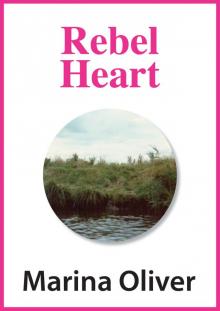 Rebel Heart
Rebel Heart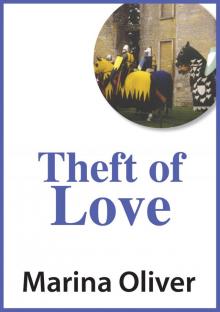 Theft of Love
Theft of Love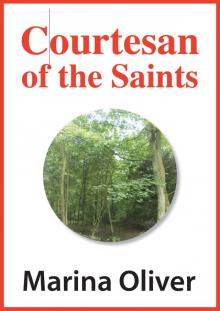 Courtesan of the Saints
Courtesan of the Saints Fatal Slip
Fatal Slip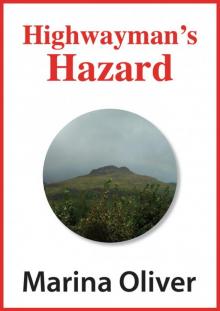 Highwayman's Hazard
Highwayman's Hazard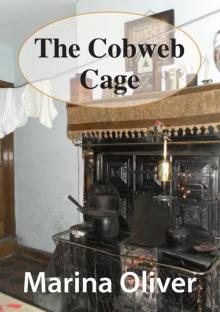 The Cobweb Cage
The Cobweb Cage The Irish Bride
The Irish Bride Apple Blossom Bride
Apple Blossom Bride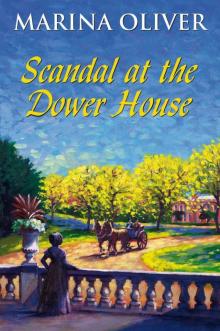 Scandal at the Dower House
Scandal at the Dower House Eugenie and the Earl
Eugenie and the Earl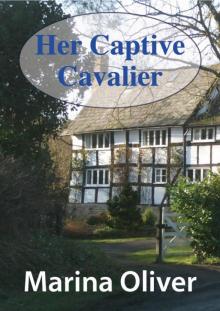 Her Captive Cavalier
Her Captive Cavalier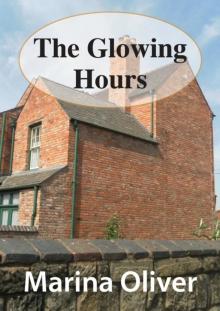 The Glowing Hours
The Glowing Hours Sibylla and the Privateer
Sibylla and the Privateer The Baron's Bride
The Baron's Bride Player's Wench
Player's Wench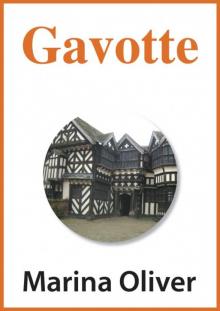 Gavotte
Gavotte The Chaperone Bride
The Chaperone Bride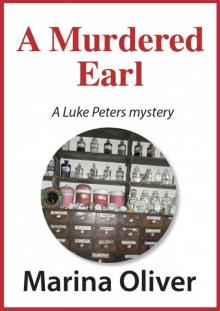 A Murdered Earl
A Murdered Earl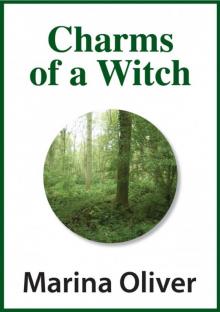 Charms of a Witch
Charms of a Witch Convict Queen
Convict Queen The Accidental Marriage
The Accidental Marriage